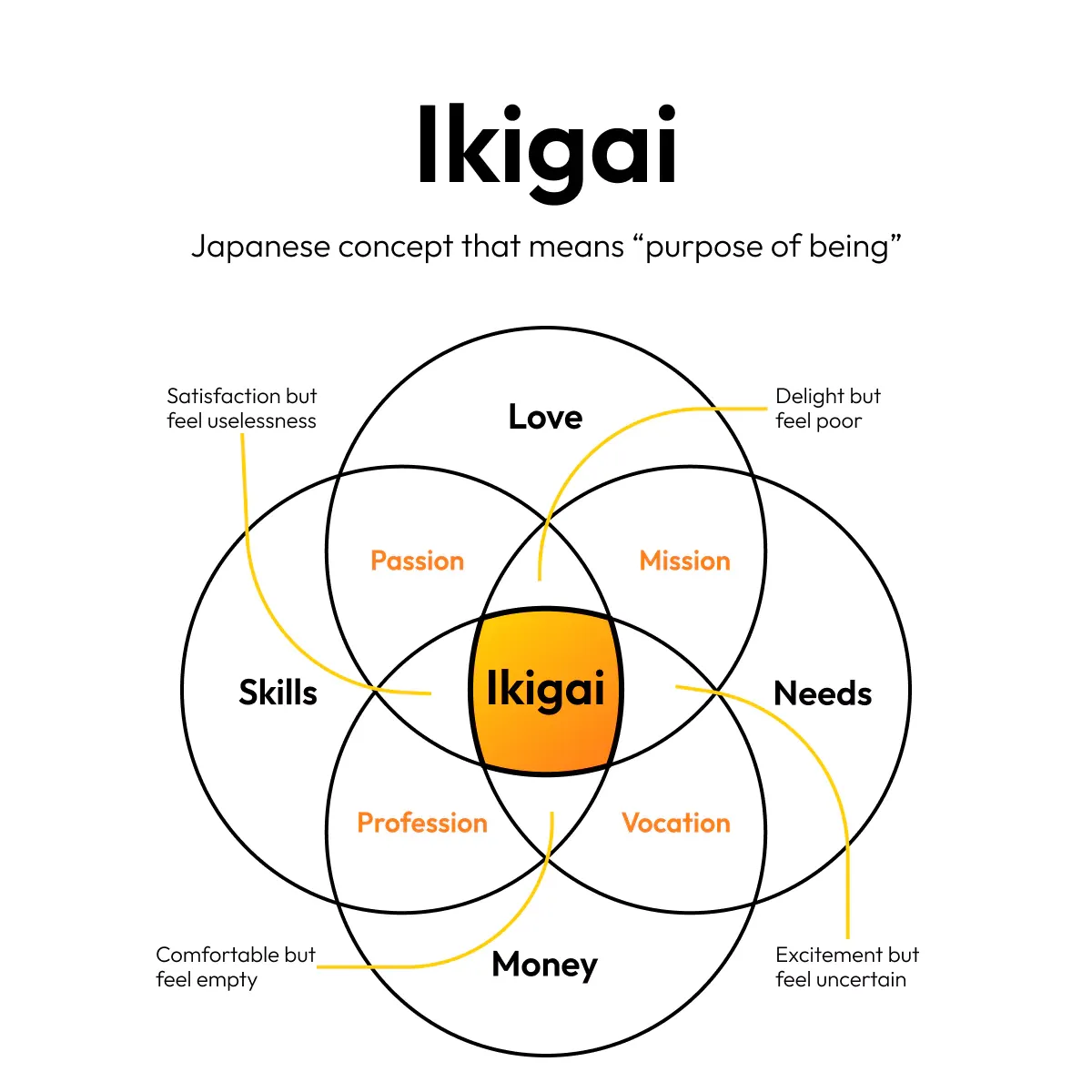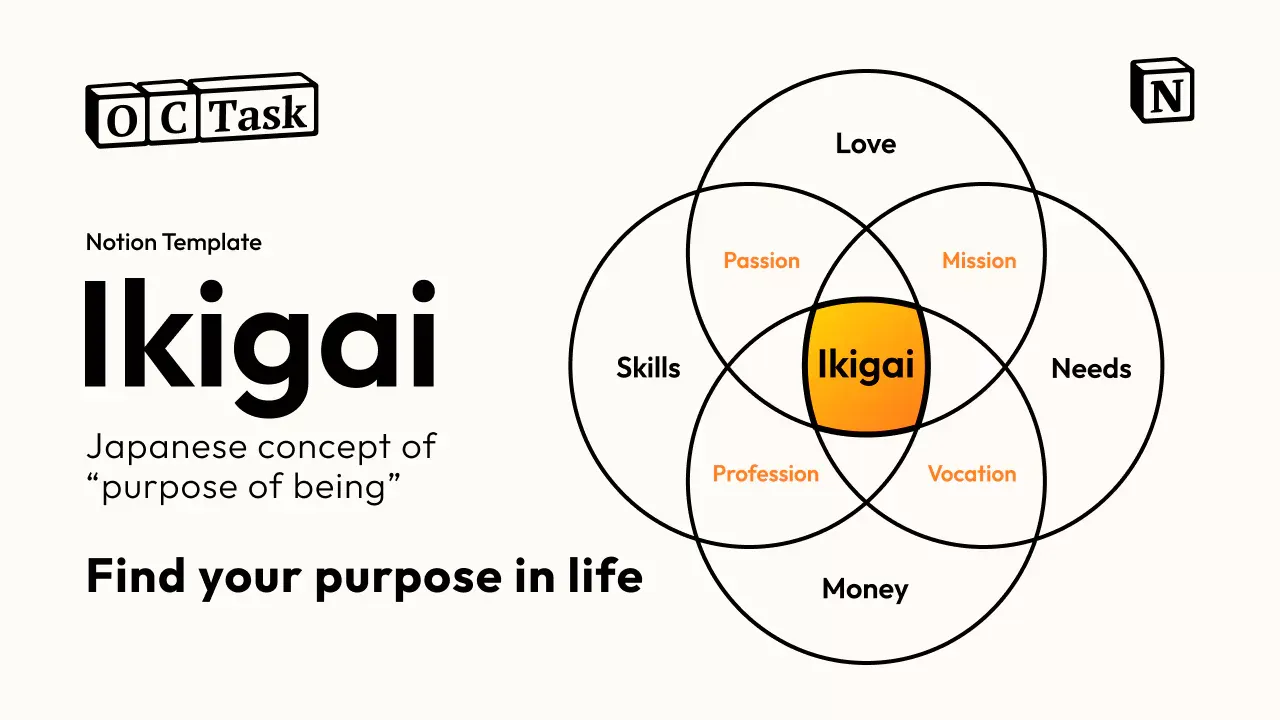Finding your ikigai
 jenxi.com
jenxi.com Vision alchemist crafting strategic innovation & AI adoption. Bridging startups to China's ecosystem advantage. Building a cyberbrain. Registered pharmacist × Brand strategist × Storyteller
The concept of ikigai has become popular recently. You might have come across people talking about looking for their ikigai or the reviews of the book Ikigai: The Japanese Secret to a Long and Happy Life by Hector Garcia and Francesc Miralles.
What is ikigai? Ikigai (生き甲斐) is a Japanese philosophy of the purpose of being.
Do you find yourself feeling fulfilled and happy with the work that you do? You probably have found your ikigai. Conversely, if you feel empty or frustrated with your career, it might mean you have yet to find your ikigai.
Ikigai is not restricted to just work and career. It could also be a hobby or passion project. However, you might not enjoy as much fulfilment if you have to work to make a living in order to pursue such passions. I will explain more later in the article.
Definition of ikgai
“Iki” (生き) means life. “Kai” (甲斐) means worth. Ikigai is what makes your life worth living. It is a lifestyle intrinsic to the Japanese that they live it with instinct and without much chest-beating.
Wikipedia refers it to a person’s sense of purpose or reason for living. Neurocsientist Ken Mogi referred to it in his book Awakening Your Ikigai as a reason to get up in the morning or waking up to joy.
When you have found your ikigai, you wake up every day feeling energised to do the work because the work you do is aligned with your purpose of being. You live for the work you do and doing it gives you happiness and a sense of fulfilment.
Note that happiness does not refer to fleeting pleasure, but more of a satisfaction of having overcome a challenge.
Where did ikigai come from?
Ikigai dates back to the Heian period between 794 to 1185. This ancient Japanese philosophy plays a major role in Okinawan culture. The southern Japanese island of Okinawa has the highest proportion of centenarians.
There have been suggestions linking ikigai to Okinawan’s longevity given that they have less desire to retire and continue working on their ikigai for as long as they remain healthy.
Of course, other factors such as the community and diet contribute to this unusual longevity. Dan Buettner wrote in Blue Zones: Lessons on Living Longer from the People Who’ve Lived the Longest about how the the same concept exists among people living long lives in places such as Sardinia and Nicoya Peninsula.
Generation feeling unfulfilled
Nowadays, we see a lot of people feeling depressed and losing motivation to drive them onwards. This trend stands out in China where the youths are “lying flat” and “letting it rot” as they become ambivalent about their lives and adopt a laid back attitude towards their careers.
I believe the situation is due to them pursuing degrees that would land them jobs upon graduation. And after graduation, they secure jobs that lets them get by but leave them feel unfulfilled.
This is not just isolated to Chinese youths, but Generation Z all over the world. They live in a time where they have to struggle relatively less than their parents. Without having to worry about putting food on the table or finding money to pay the bills, they lack the drive to push them to work hard.
Of course, I’m speaking in general terms. There are outliers who still need to struggle and those who have found their ikigai. Both of these groups possess the motivation to keep them going.
Why is ikigai important?
Your ikigai makes you wake up every day ready for the challenge for the day, and empowers you overcome the challenges and keep going. The theory among researchers is that ikigai can potentially make you live longer with a purpose and direction that would make it a life well lived.
Your ikigai is what drives you. It gives purpose to what you do, and that brings about motivation and satisfaction. It also steels you with the persistence and resolve to power through the downs and overcome obstacles you’ll inevitably face.
Have you noticed that some work you do feel boring and meaningless? And there are those that you meet with eagerness and dive into while others are unable to see the meaning in them?
When you work on your ikigai, you are in the zone or in the flow. Psychologist Mihaly Csikszentmihalyi says that when we are in the flow, we produce our best work to do something difficult but worthwhile.

How to find your ikigai?
Your ikigai is something that encompasses is:
-
What you love,
-
What you are good at,
-
What people would pay you for,
-
Or what the world needs.
Your ikigai is the sweet spot that sits in the overlap of these four qualities.
When it is missing one quality, you will find that what you’re doing seems to fall short in some way.
-
When it is not what you love to do, you will be comfortable but feel empty.
-
When it is not what you are good at, you will be excited but feel uncertain.
-
When it it not what people would pay for, you will be delighted but feel poor.
-
When it is not what the world needs, you will be satisfied but feel useless.
When you’re missing more than two quality, you end up with:
-
A passion that you love and are good at, but people don’t need and won’t pay for.
-
A mission that you love and is what the world needs, but you are not good at and won’t get paid for.
-
A vocation that is in demand and people would pay for, but is neither what you love nor what you’re good at.
-
A profession that is what you’re good at and what people would pay for, but you don’t love and might not necessarily be what the world needs.
Guide to finding your ikigai
The process to find your ikigai is takes some time. Don’t expect to suddenly know what your ikigai is. You need to reflect upon and observe yourself to discover what you find true meaning in.
Be easy on yourself and give yourself time to discover what are the options that could be your ikigai.
We start with an outside-in approach to find ideas that are our potential ikigai. Then we flip things around and use an inside-out approach to understand how feasible each idea is.
Outside-In
To find your ikigai, you list down at least five things for each of these qualities:
-
What you love.
-
What you are good at.
-
What people would pay for.
-
What the world needs.
Idea brainstorming
Once you’re done with the lists, you start to find overlaps. Using the overlaps, you think of ideas that could be your ikigai. For example, you love drawing comics in a topic that people would want to read and be willing pay for. This could be one idea.
Come up with as many ideas as you can. You don’t need to do this all in one sitting. It is important to think and take the time to brainstorm.
Inside-Out
Once you have the ideas, you score them for each of the following questions out of a scale of 10:
-
How much do you love it?
-
How good are you at it?
-
What is the relative the income potential compared to the other ideas?
-
Is it in demand?
Add up the scores for each idea and we will look at how to identify your ikigai.
Identifying your ikigai
Your potential ikigai can be ideas with high total scores. However, it might not necessarily have the highest score. It can also be ideas with a good balance across four columns. This means that it has a good spread across the four values instead of being skewed.
The process might seem a bit complicated. Don’t worry if you feel overwhelmed. It is normal. Allow your mind to digest the questions and think them over.
Ikigai Notion template
Some people work well with pen and paper. Others prefer using software such as note-taking apps. Being the geeks we are, Matt and I created a free ikigai template for Notion. It is easy to fill up and walks you through the process to identify your ikigai.

Conclusion
Finding your ikigai doesn’t mean you will be able to dive into it right away. The key is focus on the details and take small actions that would bring you closer to your ikigai.
Take note of the scores you gave. You might want to ask yourself how you can make small changes that would boost your score for a particular question for an idea you prefer. For example, taking classes to become better at something. Or refining the idea so that the output has more demand or income potential.
You will know when you’re ready to embrace it and pursue your purpose of being. Remember that you are not stuck to what you chose. You will have a better sense of what the work entails and your scores for the idea might change so much that it no longer makes sense as an ikigai option.
At least you tried and confirmed that it is not for you. Try something else. Bear in mind that even if ikigai is your purpose of being, there might be some aspects or certain tasks that you won’t enjoy. You would have to either accept them or find ways to outsource them so you can focus on what you love.
If you have any questions on how to use the template or just want some guidance or discussion on the process of finding your ikigai, don’t hesitate to reach out.